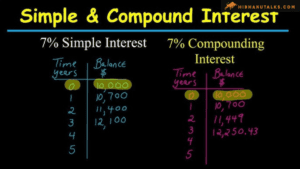
The Power of Compound Interest in Mutual Fund Investing
Contents
- 1 Compound interest mutual funds
- 1.1 The Power of Compound Interest in Mutual Fund Investing
- 1.1.1 What is Compound Interest?
- 1.1.2 How Compound Interest Works in Mutual Funds
- 1.1.3 Why Compound Interest is a Game-Changer in Mutual Fund Investing
- 1.1.4 Real-World Example: The Magic of Compounding
- 1.1.5 Maximizing Compound Interest in Your Mutual Fund Investments
- 1.1.6 Conclusion
- 1.1.7 FAQs:
- 1.1.7.1 1.What is compound interest in mutual funds?
- 1.1.7.2 2.How does compounding affect my mutual fund returns?
- 1.1.7.3 3.Why should I start investing early?
- 1.1.7.4 4.What is a Systematic Investment Plan (SIP)?
- 1.1.7.5 5.Can I withdraw my mutual fund investment anytime?
- 1.1.7.6 6.What type of mutual funds benefit most from compounding?
- 1.1.7.7 7.How do dividends affect my investment?
- 1.1.7.8 8.Is compound interest guaranteed in mutual funds?
- 1.1.7.9 9.How can I calculate my potential returns with compounding?
- 1.1.7.10 10.What’s the best way to maximize compounding in mutual funds?
- 1.2 Compound interest mutual funds
- 1.3 Mankind Pharma’s $1.6 Billion Acquisition of Bharat Serums Approved by India’s Anti-Trust Regulator
- 1.1 The Power of Compound Interest in Mutual Fund Investing
Compound interest mutual funds
The Power of Compound Interest in Mutual Fund Investing
What is Compound Interest?
At its core, compound interest refers to the process where the interest earned on an investment is reinvested to generate additional earnings over time. Unlike simple interest, which is calculated only on the principal amount, compound interest is calculated on the initial principal and also on the accumulated interest from previous periods. This means that the more time your money has to grow, the more it can generate additional income, leading to exponential growth.


How Compound Interest Works in Mutual Funds
When you invest in mutual funds, the concept of compound interest plays a pivotal role. Here’s how it works:
- Reinvestment of Returns: Mutual funds typically reinvest dividends and capital gains, which allows your investment to grow faster. For instance, if your mutual fund earns a dividend, instead of taking it out, it gets reinvested to buy more shares. This increases your total investment amount, allowing you to earn interest on both your initial investment and the returns.
- The Time Factor: The earlier you start investing, the more time your money has to compound. For instance, investing ₹10,000 at an annual return of 12% can grow significantly over 20 years. In contrast, waiting just five years can reduce your total returns drastically.
- Power of Consistency: Regular investments, known as Systematic Investment Plans (SIPs), allow you to take advantage of market fluctuations. You buy more units when prices are low and fewer units when prices are high, which smoothens out your average cost and enhances compounding.
Why Compound Interest is a Game-Changer in Mutual Fund Investing
- Exponential Growth Potential: Over long investment horizons, the effect of compounding can lead to substantial wealth accumulation. For instance, if you invest ₹1 lakh in a mutual fund that compounds annually at 12%, after 30 years, you could potentially accumulate over ₹29 lakh. This showcases the transformative power of compound interest.
- Inflation Hedge: Compounding not only helps grow your investments but also acts as a buffer against inflation. The returns generated through compounding can help your investments outpace inflation, ensuring your purchasing power remains intact.
- Less Stress on Returns: With compound interest, you don’t need to chase high returns. A steady, reasonable annual return can yield impressive results over time. This allows you to focus on maintaining a disciplined investment strategy rather than trying to time the market.


Real-World Example: The Magic of Compounding
Let’s illustrate this with a hypothetical scenario.
- Investor A: Starts investing ₹10,000 per year in a mutual fund that offers a return of 10% compounded annually, starting at age 25 and continues until retirement at age 65 (40 years).
- Investor B: Starts investing the same amount at age 35, but continues until age 65 (30 years).
Here’s how their investments would pan out:
- Investor A: Total investment = ₹10,000 x 40 years = ₹40 lakh. Future value at retirement = ₹6.5 crore (approx).
- Investor B: Total investment = ₹10,000 x 30 years = ₹30 lakh. Future value at retirement = ₹1.6 crore (approx).
As you can see, Investor A’s earlier start, despite the same annual investment, leads to significantly higher returns due to the power of compounding over time.


Maximizing Compound Interest in Your Mutual Fund Investments
- Start Early: The earlier you begin investing, the more time your investments have to grow. Even small amounts can snowball into large sums over the decades.
- Stay Invested: Resist the temptation to withdraw your investments prematurely. Letting your investments sit and compound can lead to higher returns.
- Reinvest Dividends: Always choose mutual funds that reinvest dividends and capital gains. This accelerates the compounding effect.
- Consider SIPs: Systematic Investment Plans allow you to invest small amounts regularly, leveraging dollar-cost averaging and compounding simultaneously.
- Monitor Your Investments: Regularly review your mutual fund portfolio to ensure it aligns with your financial goals, adjusting your contributions as necessary.


Conclusion
Understanding the power of compound interest is crucial for anyone looking to invest in mutual funds. By starting early, remaining consistent, and leveraging the benefits of compounding, investors can significantly enhance their wealth over time. Mutual fund investing is not merely about selecting the right fund; it’s about harnessing the potential of compound interest to turn small, regular investments into substantial wealth for the future. The journey may take time, but the rewards of compounding are well worth the wait.
FAQs:
1.What is compound interest in mutual funds?
A. Compound interest in mutual funds refers to the earnings generated on both the initial investment and the interest earned over time, which is reinvested.
2.How does compounding affect my mutual fund returns?
A. Compounding allows your investment to grow exponentially over time, leading to significantly higher returns, especially over long periods.
3.Why should I start investing early?
A. The earlier you start, the more time your money has to grow through compounding, leading to greater wealth accumulation.
4.What is a Systematic Investment Plan (SIP)?
A. A SIP is an investment strategy that allows you to invest a fixed amount regularly in mutual funds, taking advantage of compounding and market fluctuations.
5.Can I withdraw my mutual fund investment anytime?
A. While you can withdraw your investment, doing so prematurely can hinder your ability to benefit from compounding.
6.What type of mutual funds benefit most from compounding?
A. Equity mutual funds typically offer higher returns, making them more advantageous for compounding over the long term.
7.How do dividends affect my investment?
A. Reinvesting dividends accelerates the compounding effect, increasing your total investment amount over time.
8.Is compound interest guaranteed in mutual funds?
A. While compounding can enhance returns, mutual funds carry risks, and returns are not guaranteed.
9.How can I calculate my potential returns with compounding?
A. You can use compound interest calculators available online, which factor in your initial investment, rate of return, and investment duration.
10.What’s the best way to maximize compounding in mutual funds?
A. Start early, stay invested, reinvest dividends, and consider SIPs for regular contributions to maximize the compounding effect.
Compound interest mutual funds
Mankind Pharma’s $1.6 Billion Acquisition of Bharat Serums Approved by India’s Anti-Trust Regulator





















1 comment